Torture and abuse in 2020 – story of Aksana D.
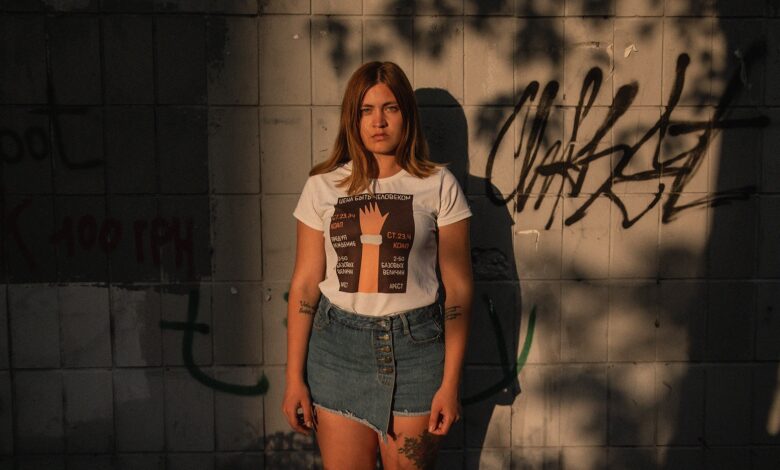
22 years old, freelancer. “I was told that child protection workers were going to visit us. That’s what sent me reeling”
Out of 12,000 Stolin inhabitants, only one person collected signatures for Sviatlana Tsikhanouskaya’s nomination as a presidential candidate in 2020. This person was Aksana Dabryyanets. She was an observer at one of the polling stations on the main presidential election day. Aksana has been actively giving comments to the media since the pre-election summer. She was forced to leave Belarus through systematic detentions, interrogations, police reports, searches, and threats of removing her child from the family. Aksana has been living out of a suitcase for four months in Ukraine. She’s afraid to admit that her child will likely go to school somewhere else, but not in Stolin.
A path that led to the August events
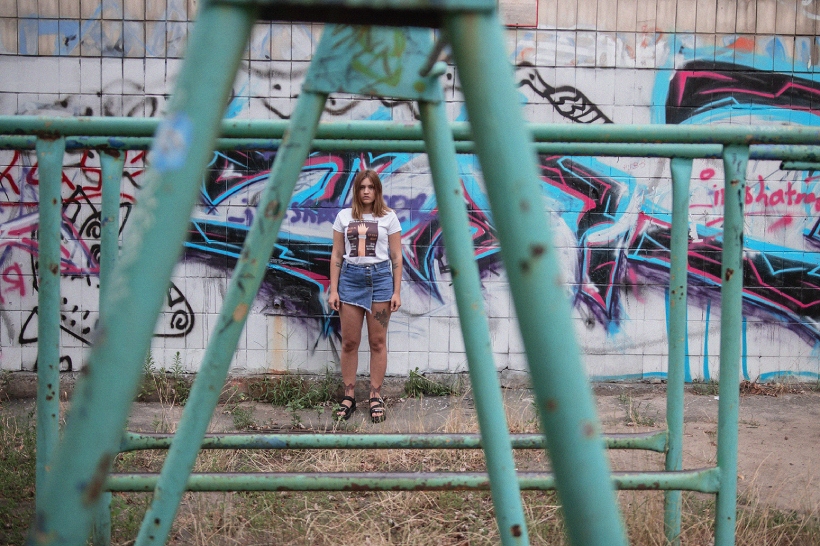
I had a baby when I was 15, and I’ve led a hard yet independent life ever since. I’ve learned firsthand what things should not be like. Two years before the presidential election, I stood on my own two feet: I was a nail technician and made good money by Stolin’s standards. I wrote letters to political prisoners, at that time there were six of them, and sent them money. But no one talked about politics. Then the coronavirus came along. I lived across the street from a hospital and saw how many ambulances brought people to the “contaminated” ward every day. I felt frustrated and indignant that people were not told the truth and left to ride this out on their own. I have always had a heightened sense of justice. All this was building up little by little, and then there was a signature collection event [for Sviatlana Tsikhanouskaya’s nomination as a presidential candidate]. This was the first presidential election I voted in. I really wanted my vote to matter.
At first, I thought to go to Pinsk [a city of about 130,000 people located approximately 60 kilometers northwest of Stolin], but then it occurred to me that many people in Stolin would also want to put their signatures. I contacted Pinsk activists, and they replied: “If you can find at least 150 people to sign, we will come for one day.” I created a chatroom right away, and the number of people in it reached 150 in a couple of hours. Then I found us a venue. On the first day, we collected 333 or 335 signatures. Stolin hasn’t seen such large-scale signature collection events since the 1990s. We didn’t put out any notices or advertisements: there are no independent media outlets in the town. Some people noticed us from their balconies and ran out of their apartments to add their signatures to the list. After we collected signatures for the first time, I couldn’t sleep for two days because of emotions. I was sure that the election results would be rigged. But the whole of Belarus had risen up, and I had no doubt we would win. I was so confident, so brave.
I served as an election observer at the school I graduated from. I didn’t vote at an advance poll as one cannot campaign for a presidential candidate in this case. I posted flyers and tied white ribbons [white ribbons and bracelets were a common symbol of pro-democracy protests in Belarus] in different locations. If I saw someone sitting next to their apartment complex, I would ask them if they were going to a polling station to vote. And senior citizens would say, “Sure, in the afternoon of the main voting day.” There was even a case when a policeman’s wife talked to me while watching me posting a flyer: “Post more of these so that all the people can see them and know whom they should vote for.” The kicker is that her husband later participated in my arrest and threatened me.
“On the first day, we collected 333 or 335 signatures. We didn’t put out any notices or advertisements: there are no independent media outlets in the town”
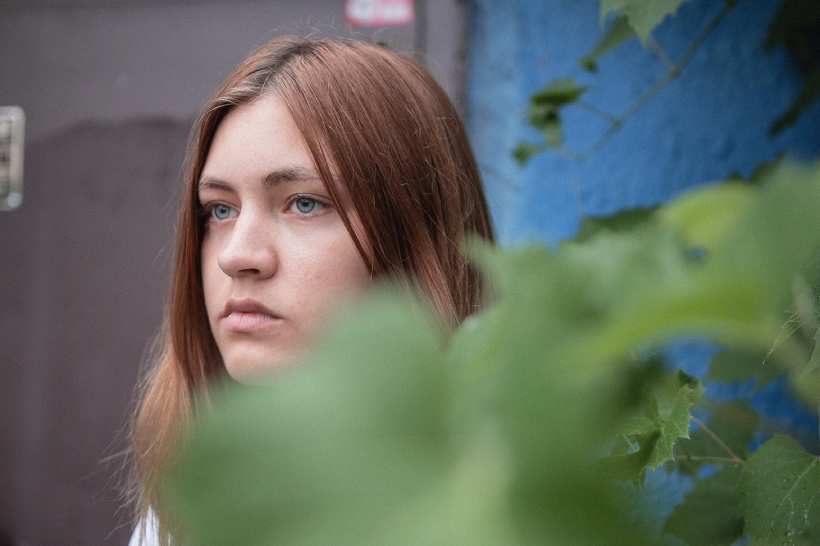
Elections used to be like that at our school: a couple of people came, and that was it. But this time around, people kept on coming to vote. They were wearing white bracelets. One person would wink at me, and another would do an accordion fold of their ballot [a common tactic used by “protest” voters during the 2020 election]; yet another person would touch my shoulder or whisper “Long live Belarus” in my ear. At lunchtime, I went to the bathroom, came back, and saw pro-government observers sitting in my spot. I began counting people who came to vote outside the polling station – and a policeman started ushering me out. Then I moved to stand next to the school entrance and later sat on a bench in the school courtyard. He started kicking me out of the school territory altogether. I didn’t leave, and people gathered around me.
Naturally, it was not possible to attend the vote counting at the polling station. A policeman came up to us twice and warned us that he would call for backup. We didn’t react to that. There were four or five of us. People were already leaving neighboring polling stations, and ours was nowhere near being closed. We saw them raise the curtains to check if we were still out there. When the policeman left, we went inside the school. All the local election committee members ran out and lined up next to one of the classrooms: “Only observers have a right to look [at the voting report].” Two of us went to see the voting results. There were around 1,000 votes for Lukashenko and 300 for Tsikhanouskaya. We were disappointed and in a state of dazed disbelief at what we had just seen.
Those were teachers who had taught me at school. Our history teacher used to criticize the government, and we discussed a lot about the Ukrainian Euromaidan. “Yury Mikhailovich, have you no shame at all?” The teachers ducked their heads and walked away in silence. That was around midnight. We decided to drive into town to see if maybe people came out [to protest]. Everything was silent.
Detention. They threatened me with rape… They said, “You’re going to spill your guts one way or another”

I was detained on August 11. There were no protests at the time, none at all. That day I went around the town and collected signatures of people who had voted for Tsikhanouskaya in my voting district to gather evidence proving that the election results were rigged. But people were afraid. I realized that someone would eventually turn me into the police. Then, a police vehicle pulled up, and they told me to climb in. Perhaps, they saw me by chance: I was wearing a “Stolin to Live in” T-shirt [the “Stolin to Live in” inscription alludes to the “A Country to Live in” project helping Belarusian political prisoners and working to build a democratic society and state. Siarhei Tsikhanouski, one of the 2020 presidential election contenders, political prisoner and Sviatlana Tsikhanouskaya’s husband, started the “A Country to Live in” YouTube channel in 2019 and initiated the creation of the eponymous fund]. I asked them to identify themselves, but two men ran out of the car, twisted my arms, threw me in the car, and took me to the police station.
I told them that I have a small child. They started yelling: “That’s what you get for wandering around.” It takes 10 to 15 minutes to get to the police station, and this whole time they were yelling at me and saying, “Our brothers [fellow policemen] were beaten up in Pinsk because of people like you. We are so going to put you in jail,” and so on. They ripped my phone out of my hands.
The police station employees couldn’t explain why I was brought to them. Five or seven policemen were in the office: “Go ahead and fess up.” It was unclear what I was supposed to confess to. They started interrogating me and asked if I had been to Pinsk. There were protests in Pinsk. I started telling the policemen about my constitutional rights (Article 27 of the Belarusian Constitution entitles one to the right not to testify against oneself or one’s close relatives – August2020), but they started yelling and insulting me. They threatened to rape me if I didn’t start talking. They promised to put me in jail for 24 hours and take my kid away. They said, “You’re going to spill your guts one way or another.” They laughed at my requests for a lawyer.
They pressured me extremely hard for a while, and I felt sick and started sliding down in my chair. They laughed, “Should we call you an ambulance?” I realized that they were just ridiculing me. I asked for a drink of water, and they brought me some. But I was scared as I didn’t know what was in the glass. They took me to the water cooler. I was horrified. I had already seen what was happening in Minsk because I had an internet connection. I tried to keep my cool at the police station not to get beaten or raped there.
“Bitches like you should not be beaten only, they should be executed.” – “What kind of bitches?” – “The ones that go to protest rallies in Pinsk”
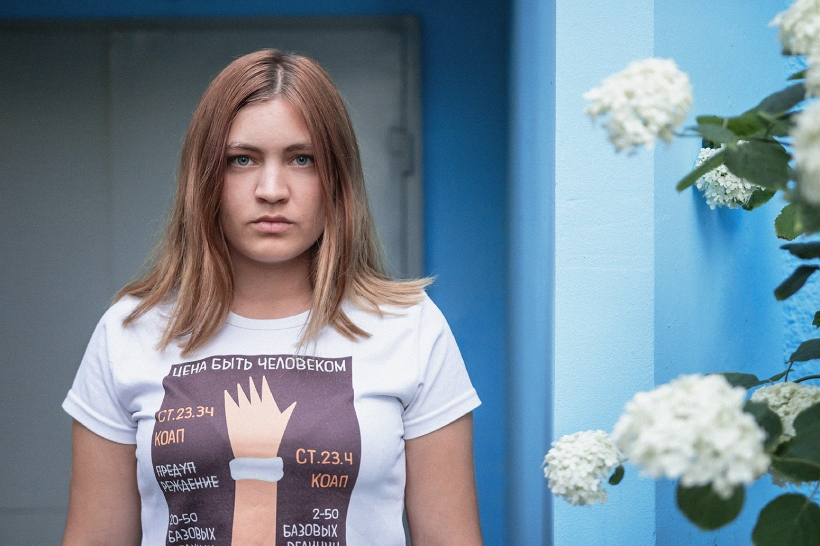
The police station employees would walk into the office where I was and laugh, “Oh, this c*nt is sitting here,” and walk away. At some point, another policeman, clad in black, came in. He sat down across from me and started clenching his fists, harassing me, and yelling, “Bitches like you should not be beaten only, they should be executed.” – “What kind of bitches?” – “The ones that go to protest rallies in Pinsk.” (I only went to a signature collection event in Pinsk before the elections.) I had a feeling he was going to hit me because he started winking at other policemen, and as on cue, they began clearing the office. Then I piped up: they asked me about Pinsk, why I started collecting signatures, and why I was against Lukashenko.
They found correspondence with a friend in my phone: we discussed if anyone in Stolin would come out to protest. I wrote that everyone in Stolin was afraid, and I would probably go to Pinsk. They started yelling, “Well, now you’re so going to jail.” They deleted some of the photos and videos from my phone. A video from Pinsk, in which protesters dispersed the riot police, was automatically saved from Telegram. At first, they whined about being beaten and utterly miserable and unfortunate. And then they watched that video: “Oh, look, look, it’s a trash can flying at me! And that’s a stick flying at me!” They were laughing.
While they were filing a second police report against me for posting campaign flyers, one of the policemen said: “You should have a cop husband who would f*ck you so you wouldn’t be wasting your time on this sh*t.” He would take his wedding ring off in front of me, and I don’t know what for.
Only one person knew I had been detained because I was talking to him over the phone. He passed this information on to his friends and acquaintances, and eventually, my mother heard it through the grapevine, too. When she called my phone, the policemen declined her call. My mom called the police station around the same time and was told that I wasn’t there. I realized what the reason for not sentencing me to administrative detention was. My acquaintances said that when I was at the police station, a lot of people carrying bags were seen next to it. These were relatives of the detained Pinsk residents. Stolin’s detention facility does not have many cells, so the existing ones were likely overcrowded.
I signed the police reports because it felt like I had spent an eternity at the police station. I didn’t know if they would let me go. I had been detained for 7.5 hours there. I left the building at about 4 am. I was wearing light clothing, it was dark outside, and I didn’t know what time it was. I told the policemen: “Take me back to where you arrested me.” At first, they gave me an attitude but eventually found a car and drove me back.
It took me a long time to recover from stress the following day. I went to a protest demonstration one day later. I was going to a single-person picket, but more than 30 people turned up. There were 300 people on the second day, and more than 500 participated in a protest march. When people stopped taking to the streets in Stolin, some went to Minsk to protest.
A policeman shouted: “The Constitution does not work in administrative court cases.” Right in front of my lawyer
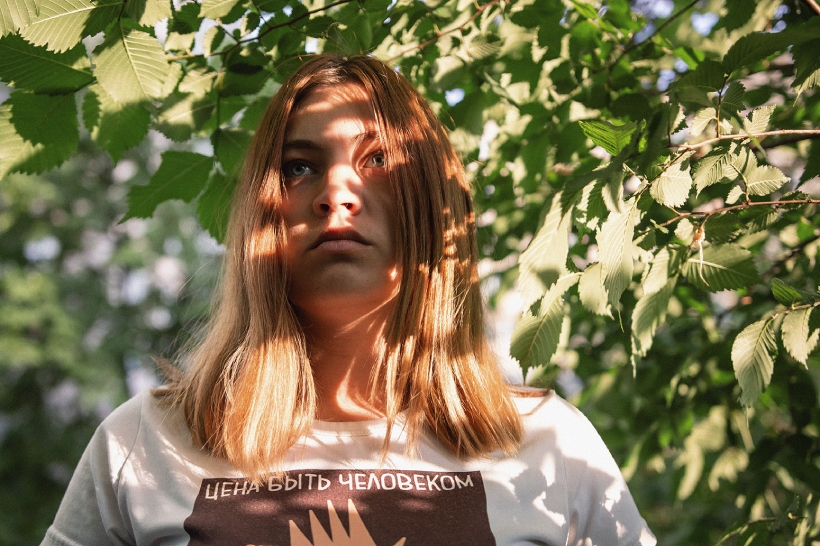
I hired a lawyer and started drafting a complaint about my illegal detention. Naturally, runarounds were all I was getting. One of the replies stated in bold letters: “In case of repeated appeals containing information that does not correspond to reality, your actions will be legally assessed as per Article 9.2 “Defamation” of the Administrative Offenses Code of the Republic of Belarus.” During court hearings, the policemen claimed I had come to the police station of my own volition.
The administrative case for campaigning was closed for lack of corpus delicti. The second administrative case against me, launched for participating in an unauthorized mass event, was returned from the court for revision because they couldn’t prosecute me based on one phone text. Another funny thing: on August 11, I did not want to sign a police report but saw that the title read “an interview report”. They give witnesses such a report to sign. I thought I could easily contest this case later with the help of a lawyer. But they added the wording “an interview report of a person against whom administrative proceedings are conducted” in ink at a later time. And this was considered acceptable.
I just had to wait for a week or two: if they didn’t call on me to come and witness a rewriting of the police report, the case would be closed as the statute of limitation would expire. But they needed to catch me. The police would stay near my home and observe me. One day they started knocking on my door. I didn’t open it. They must have seen me inside and started breaking in. The door of my home was old: one blow, and it would be broken off its hinges. I waited this out and came to the police station with the lawyer.
They tossed the police report on the phone text and started writing one on my participation in an unauthorized mass event. They tried to throw my lawyer out the door and yelled at me, “You have to testify against yourself.” When I cited my constitutional rights, a policeman shouted: “The Constitution does not work in administrative court cases.” Right in front of my lawyer. In the end, he started reading out the report, then he just lost it and threw the Administrative Offenses Code when he found out I was right. That must have looked hilarious. My lawyer started writing a complaint and was yelled at, “We’ll put you both in jail!” Eventually, the policeman deflated: “Well, if you don’t want to testify against yourself, turn in these people (shows me a video) who were out in the town square.” And the same story again.
My trial was held a day earlier because they mixed up the deadlines, and I wasn’t notified in time. As a result, I was fined about $280 USD. A provision in the police phone examination procedure allowed for a phone’s complete or partial destruction. When they returned my phone after the examination, it was no longer functional.
A police search and subsequent departure. “You live with an expectation that they would ‘calm you down’, ‘pacify you’, and ‘shut you up'”
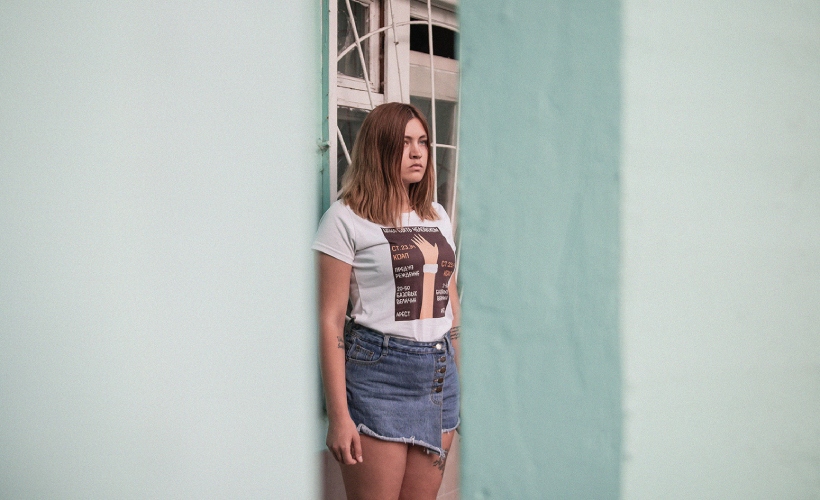
I have been writing for the Pershy Rehiyon (First Region) media since September. There are no independent media outlets in Stolin, but there is much information to share and spread. I was already well-known in our town, and people would send me information as soon as anything happened. I would help people: I would consult a lawyer or give a bit of advice on legal matters to people who asked for help. I was glad that people knew they could turn to me. Then, after my detention, I posted about my situation on Facebook, and a woman offered to help me with a lawyer. I also volunteered to bring care packages to detainees. I was alone in all this, and no one helped me much. I went to participate in protest demonstrations, too. I attended trials. I was like under a magnifying glass.
Then, I was summoned to the Investigative Committee. For the first time. I got served a subpoena. Someone left graffiti insulting the police on one of the buildings in our town. I didn’t even know where that building was. However, for some reason, I was a witness in this criminal case. About two months later, I came home in the afternoon and heard noises in the entryway. I realized that they were probably after me.
I only took cabs for the first two months after my detention because I was told: “We will keep arresting you if we see you wearing any ‘provocative’ T-shirts or anything else.” I was afraid of cars. But then, you simply start living with an expectation that they would “calm you down”, “pacify you”, and “shut you up”. I was too much of an activist for Stolin, where they wanted to show this false front of how everything was quiet and peaceful and no one protested. I was so tired of living my life waiting for them to come. So much so that when they finally came, I felt some relief, I already knew my future.
“I knew they were going to take me away, but I had to make them work for it a little bit”
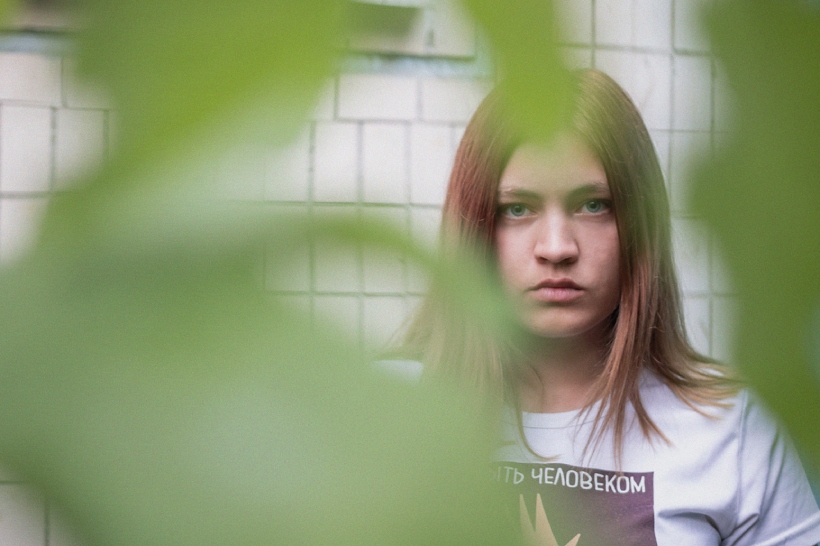
Attesting witnesses and four or five policemen were present. They showed me a search warrant. I asked that my lawyer be present, and the policemen declined the request. They refused to let us take a video of the upcoming search and did not allow independent attesting witnesses. They said that since the criminal case was launched because of the graffiti, they would be looking for spray paint cans. They came to search me as a witness. But out of all the people in Stolin, they came to me only.
The search lasted 45 minutes, and that went absolutely fine. They carefully went through all my personal belongings. However, they seized my “Stolin to Live in” T-shirt, a poster, media articles about me that I printed out, a white-red-white macrame bracelet, and an old film camera. As soon as they turned off their video camera, they told me: “Give us your phone.” “You are searching my apartment – that’s where you should be looking for the phone.” The phone was in my pocket all along. “No, you must give it to us.” I started arguing with them and citing articles from the Code of Administrative Offenses. They started yelling at me, “Give us the phone voluntarily because we’re going to grab you and take it from you anyway. Is that what you want? We will also pin ‘resistance to a police officer’ on you.” The attesting witnesses had taken their leave by that time, and three policemen stayed behind.
They’d pressured me for about three hours. They called the Office of Juvenile Affairs and told their representatives to come and pick up my child from school because they were detaining me. The police tried to remove me from my apartment. They yelled at me for giving comments to the media: “If you don’t shut up, we will put you in jail.” They called their supervisor, and I heard phrases like, “She won’t give it to us, so what should we do? We can’t just take her away…” I felt I was doing something right at that moment.
I knew they would take me away, but I had to make them work for it a little bit. I didn’t even bat an eye. When they said they would take me to the police station, I packed my things up, sat down, and waited for what would happen next.
Then a female police officer and the same attesting witnesses arrived. They didn’t ask me for permission to enter my apartment and went in as if it were their own home. I locked all the rooms and told them to stay in the hallway. In the end, the policewoman pinned me against the wall and took the phone out of my pocket. She started filling out the paperwork saying that the search was over. And they left. All in all, the apartment search took five hours.
I have developed something in between fear and disgust for men because of the detentions, searches, and the way policemen, these so-called “men”, acted toward me.
“My daughter was bullied at school because of me. She tends to get a nosebleed when nervous. A pool of blood forms on the floor when she takes off her outerwear after coming home from school“
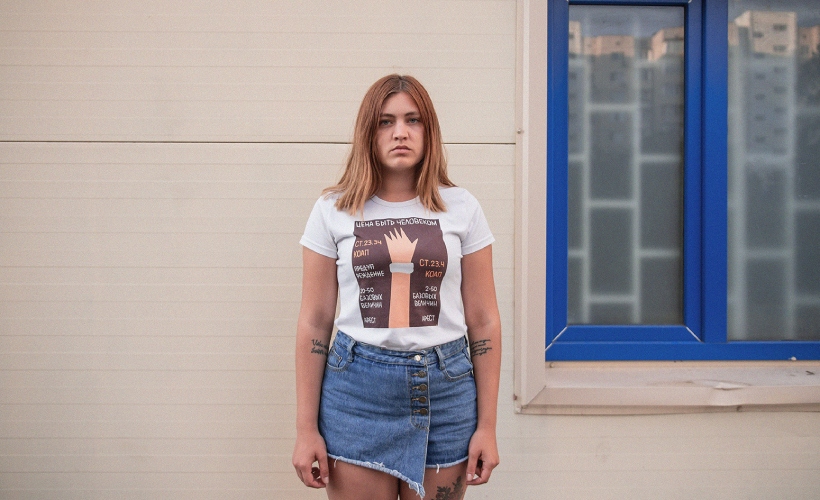
I realized that they would not leave me alone. I started thinking about moving elsewhere. A day later, I got a call and was told that child protection social workers were coming to see me. That’s what sent me reeling. It took me literally 15 minutes to pack up. Were it not for that phone call, I would have stayed in Belarus.
I called my mom: “Please get the kids together and go outside for a few minutes.” I came up and told them that I was leaving for Ukraine. I did not want to leave. It’s as if you are betraying something. I was trembling. My mom started crying, and the kids were bawling. We stood like that for five minutes, said our goodbyes, and my daughter and I left. I am happy that there is such a warm and kind link between my parents and me. When I lived in Belarus, I didn’t think I felt a need to be with my mom that much. When I left the country, I started feeling a dire need for my relatives to be around.
We left for Ukraine over the weekend, and on Monday, I learned that a case was opened against me for disobeying the police. My understanding is that they wanted to place me under administrative detention, and then I would have had zero chance of getting out of it. I have lived in Kyiv since February 2021. In Stolin, the local office of the Department for Combating Economic Crimes summoned my friends and acquaintances and questioned them about me. That means some kind of financial investigation is ongoing. I don’t understand why it was launched, even though the police asked me during the search if I had paid anyone or received any payments myself. They also were interested in learning who funded the protests.
I had a hormonal imbalance and dizzy spells because of my predicament. I went to therapy to help manage panic attacks. At the moment, I’m taking sleeping pills. Before that, I used to sleep two to three hours a night: upon waking up from a nightmare, I wouldn’t go to sleep again as I was scared. Immigration made all this worse. As we were leaving, we got in a traffic accident near Minsk. A severe snowstorm hit, and at first, we skidded into a ditch. When we pulled out of it, another vehicle crashed into our car. That was a traumatic experience. I feel safe here in Ukraine. But when I hear that my friends and acquaintances are called to the police station about me and my activities, I start worrying about my loved ones and harking back to all the cases of injustice I’ve witnessed. This makes me feel awful. Sometimes I can’t get out of bed for two days straight and even forget to eat.
In Belarus, my daughter was bullied at school because of me. Her teacher was a yabatska [the slang word “yabatska” is a portmanteau of the word “ya” (“I am”) and “batska”, which means “father” in Belarusian and is believed by some to be a common nickname for Lukashenko in Belarus; literally “I am the father”. Coincidentally, the word “yebat'” means “to f*ck” in Russian. The term “yabatska” refers to staunch and outspoken supporters of Lukashenko and his regime]. She saw photos on my daughter’s phone: my daughter attended all the protest rallies with me. The teacher made her stand in front of the whole class and started reprimanding her. “Everyone who goes to the square to protest is a drug addict and an alcoholic. What about your mother?… She gets money [for protesting] from Poland.” She slapped my daughter on the hands with a ruler and picked on her. The teacher also said she was going to punish my daughter by making her repeat a school year. My daughter tends to get a nosebleed when nervous. A pool of blood forms on the floor when she takes off her outerwear after coming home from school. She started getting ill frequently. I paid a visit to the school principal. Our school principal is the only person who wasn’t complicit in the rigging of the election results. I started sending my child to school less often: the coronavirus was raging then, too.
My daughter was aware of my detention. Since I lived in anticipation of an arrest, I was preparing her for the fact that if uniformed strangers picked her up from school at some point, her daddy or grandma would come to get her, and everything would be fine. She misses everyone very much and cries a lot.
“Now I need to use this time for self-development to grow into a person who would be useful in New Belarus”
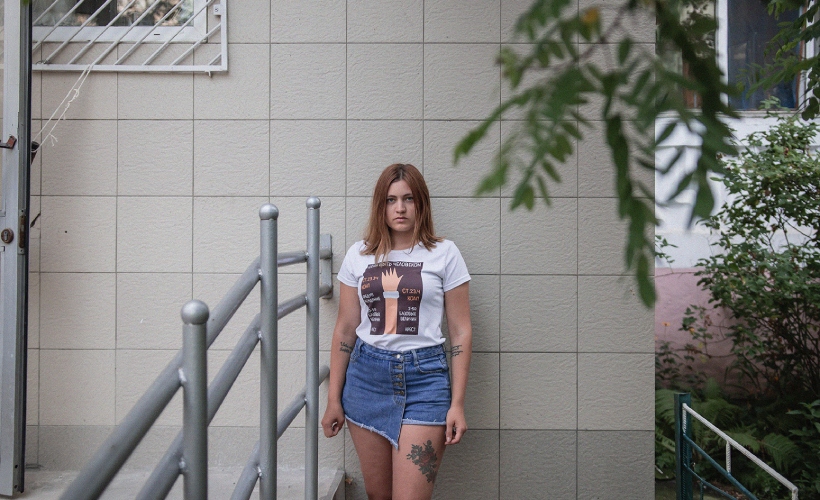
I had a lot of support from Belarusian immigrants around the world. But I wanted to be supported in my town. I felt hurt. People stopped coming to me to have their nails done back in September. I was featured in the media, and they might have been afraid. The most loyal stayed by my side. Some people in Stolin supported me. These are my clients and a couple of people I didn’t even know in person. I am very grateful to them. But I was bullied as well. People started writing to me: you have left and have no right to say anything on Belarus-related topics. The rumor had it that I was going out to protest in the town square just for money.
It was a shame that everything in Stolin went so quiet. I don’t know if people are scared or just don’t understand their importance… Freedom has to be fought for. In my town, people have always had this frame of mind that can be described as “I don’t care what happens so long as it doesn’t happen to me”. The authorities started clamping down on the businessmen who had gone to the protest demonstrations in the town square. For some reason, the locals did not stand in solidarity with these people. There were two private grocery stores, and then a Khit [a chain store] was opened next to them. And people started doing their grocery shopping in this Khit. I called on them: let’s support our local businessmen, they have collected money to help pay fines [for people who took part in the protests and were fined as a result]. I can somehow try to understand the people but cannot accept this attitude.
Here, we all know that we are not going home anytime soon, and we are trying to accept this fact. After having lived in Ukraine for almost half a year, I have two plates, two mugs, and two spoons at home. I can’t buy my own dishes and cutlery – this is some form of resistance. Many people here are in the same state. I realize that my grandmother is in her 60s, and if something happens to her back in Belarus, I won’t be able to come. I have little brothers, the oldest is 13 years old, and they cry because they miss me. The other day my brother got a call (to a phone number I left as my contact info) from a policeman who asked about my whereabouts. My brother is in the third grade. He said: “Aksana is in Ukraine, she is not here, don’t call me again.” And then he kept crying and apologizing to me, “Are you sure I didn’t harm you in any way?” I comforted him and reassured him that he had said the right thing.
When you read the news, you can’t predict how much more we will have to live through to walk this path to the end. It is all painful and traumatic, but I understand that in any case, a regime change, something we have been waiting a long time for, is going to happen. I can say that I am strong and brave and that I will succeed. I have become more confident. I realized that my choice to leave and remain free was right. Now I need to use this time for self-development to grow into a person who would be useful in New Belarus.
P.S. Aksana appealed the court ruling and filed complaints regarding the police actions against her more than once. These attempts have proved fruitless. Aksana suspects that a criminal case was opened against her in Belarus.
Author: August2020 project team
Photo: August2020 project team
